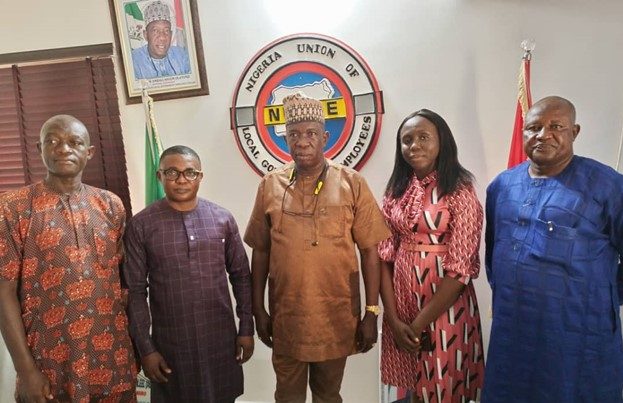
Social Development Integrated Centre, Social Action with the support of the United Nations Democracy Funds (UNDEF) launched a campaign on “Strengthening Advocacy for Transparent and Inclusive Budgeting Processes in Local Government Areas in Nigeria”. As part of the campaign objective, Social Action and its Anticorruption Network partners (AcoNET) paid an advocacy visit to the National President, Nigeria Union of Local Government Employees (NULGE), Comrade Akeem Olatunji Ambali.
The visit which took place on the 16th of November, 2021 was partly to commend the Union for their impact in advocating for the effectiveness of Local Government administration in Nigeria and to work out collaboration between Social Action and NULGE.
Speaking on the role of Social Action in the campaign for local government autonomy, the team lead, Comrade Botti Isaac said the key to a successful campaign is consistency. He said Social Action is resolved to push continuously for Local Government Autonomy. To this end, a National Dialogue has been scheduled for 1st December 2021. The Dialogue among other objectives will request President Muhammadu Buhari to sponsor an executive bill to be passed by the National Assembly for LGAs Autonomy. The team further invited the National President and members of his union to the dialogue.
Delighted by this, Comrade Ambali assured Social Action’s team of NULGE’s involvement in the project and confirmed his participation at the upcoming dialogue. He lamented the draconic structure of Section 7(2), 1 and 2 of the 1999 constitution as amended and posited a structural change in the administration of Local Governments. According to him, the local governments will only function effectively when it is Independent, hence the urgent need for Local Government Financial Autonomy. This autonomy he explained will bridge the infrastructural gap that exists in local government areas of Nigeria and make the local government councils a suitable place for work. By this, the Nigeria Union of Local Government Employees will continuously fulfill its patriotic obligations and strive to ensure that LGAs in Nigeria are granted the financial freedom to act in the interest of the people.
The Nigerian state operates a three-level system of governance responsible for the welfare of its people. While the Federal and State level of government carries their duties independently, the Local government appears to have been clamped down. Section 7(1) of the 1999 constitution as amended guarantees the survival of the local government but Section 8 of the same constitution restricts it. That section of the constitution confers too much power to the States and the house of assemblies on oversighting the local government to the extent of managing its finances. Sadly, the States and House of Assemblies use this opportunity to siphon funds meant for the Local government.
This no doubt has rendered the local governments in Nigeria ineffective. The government closest to the people and responsible for bringing socio-economic development to the grassroots is unable to do so effectively.
